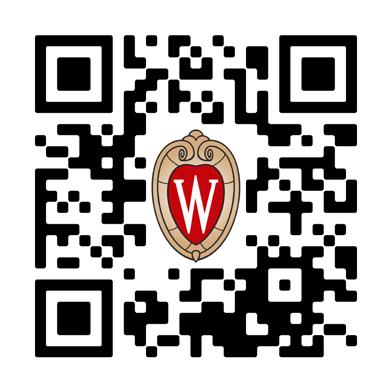2023 ANNUAL REPORT

Advancing animal and human health with science and compassion.
 Photo Credit: Seth Moffitt
Photo Credit: Seth Moffitt


 Photo Credit: Seth Moffitt
Photo Credit: Seth Moffitt
This year marks my 11-year anniversary as Dean of the School of Veterinary Medicine, and I continue to be proud of all that we have accomplished in support of our teaching, research and clinical service missions.
I recently welcomed the class of 2027. We received our highest number of applicants (2,184) for the 96 slots we had available for the class, making it one of our most competitive years.
We continue to move forward with our curricular revision process led by faculty from each of our four departments, termed the Nimble Working Group. We hope to finalize the modules for Phase One and Phase Two of the curriculum in the coming months, with the goal of launching our curriculum in the fall of 2025 for the Class of 2029.
This past year also was our most successful year in total research and extramural awards, totaling $38.4 million. This achievement highlights our exceptional research faculty and the importance of the School of Veterinary Medicine in advancing both animal and human health.
Speaking of highlights, the UW-Madison School of Veterinary Medicine was recently ranked as the #7 veterinary medical school in the nation according to US News and World Report and #15 in the world according to the 2023 QS World University Rankings.
This year also marks the University of Wisconsin-Madison’s 175th Anniversary. As the state’s first and flagship campus, founded in 1848, the university has always pushed beyond its boundaries in teaching, research, and public service to impact lives everywhere.
The construction of our new North Building is nearing completion with the goal to be up and fully functional in the late winter to early spring of 2024. Particularly with this project, I want to highlight our donors and their generosity in support of our building expansion project, without which we would not have enumerated the project, one that will position the school to excel in the coming decades. A huge thank you to all of our donors and friends of the school.
As a reminder, we will continue to remodel our current South Building after moving into the North Building through 2024, hopefully completing the remodeling by early 2025.
Between the opening of the Bakke Recreation & Wellbeing Center, our relatively new parking ramp and the new North Building, the landscape on the near west side of campus has changed dramatically over the last five years. It’s an exciting time here at the UW School of Veterinary Medicine and I look forward to the coming years as we continue to advance the education we provide to our students, the research we conduct to benefit both animal and human health and the clinical care we deliver in our hospital.
Follow Dean Markel on Twitter:



Dean, UW School of Veterinary Medicine
Vilas Distinguished Achievement Professor
@UWVetMedDean
Above: Dean Mark D. Markel flashes the “W” while on a site walk of the new North Building in September 2023.
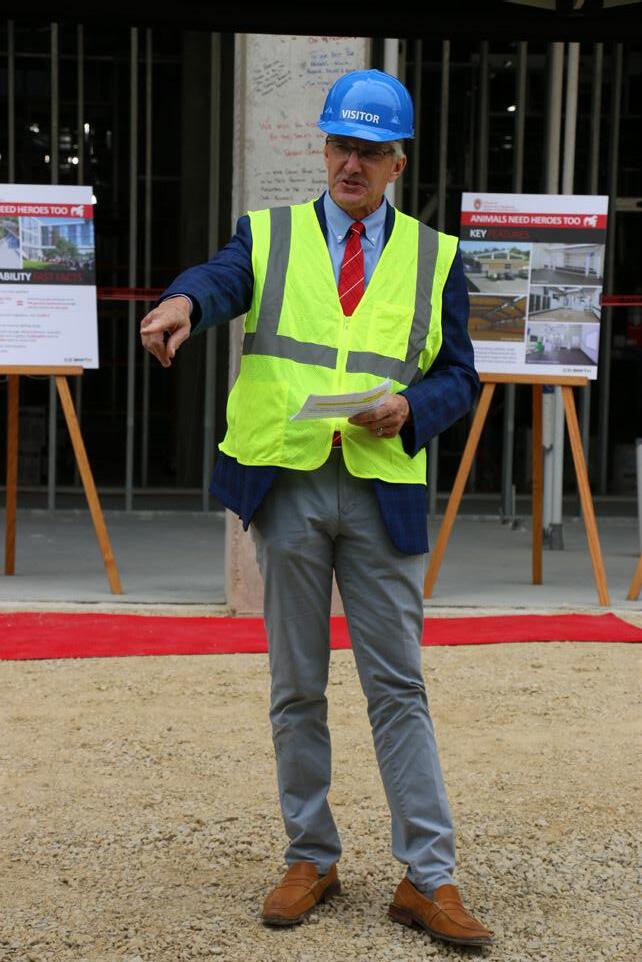
Right: Dean Mark D. Markel gives a speech at the ceremonial “Topping Off” event in fall 2022. This occurs when the final structural beam is raised into place, completing the building’s frame.
 Photo Credit: Seth Moffitt
Photo Credit: Seth Moffitt
Photo Credit: Seth Moffitt
Photo Credit: Seth Moffitt
veterinary medical school in the nation
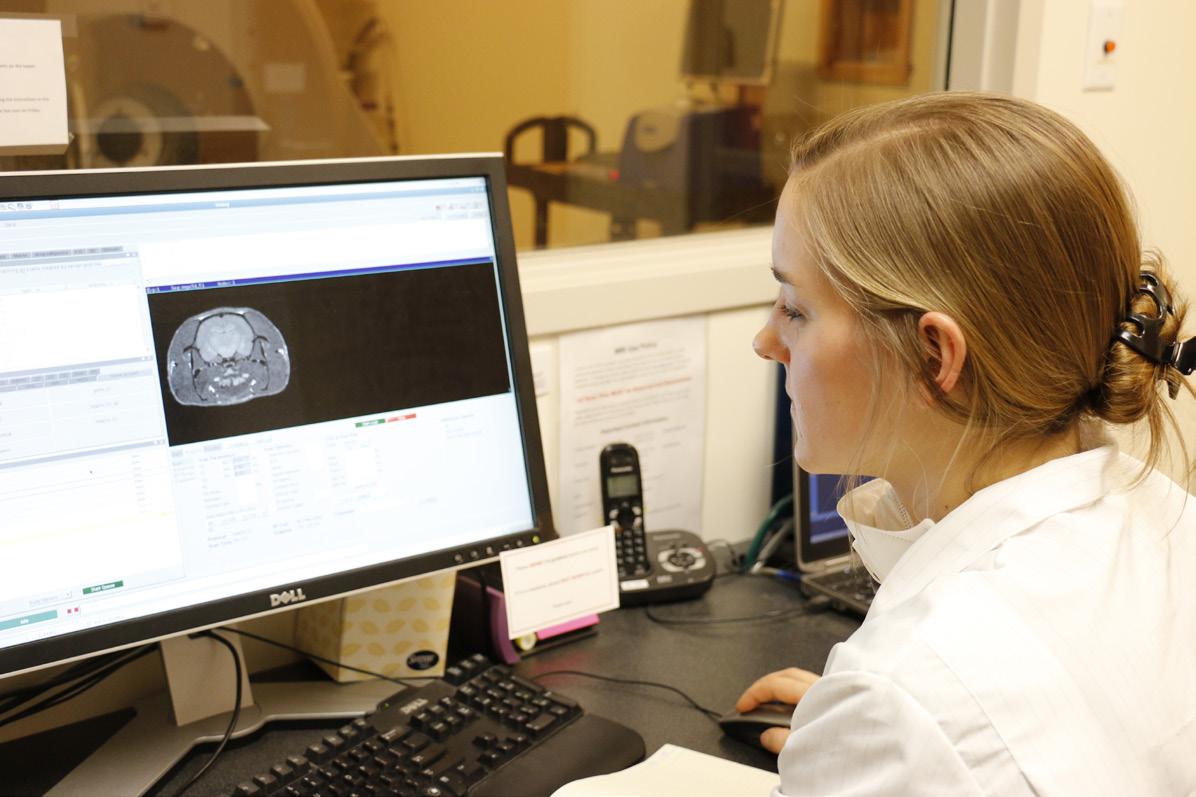


$38.4 M Total Research and Extramural Awards (Federal and Non-Federal) 2022-2023
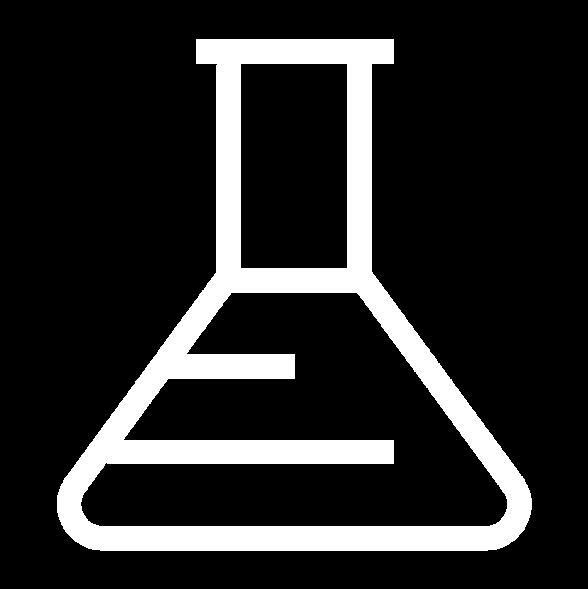
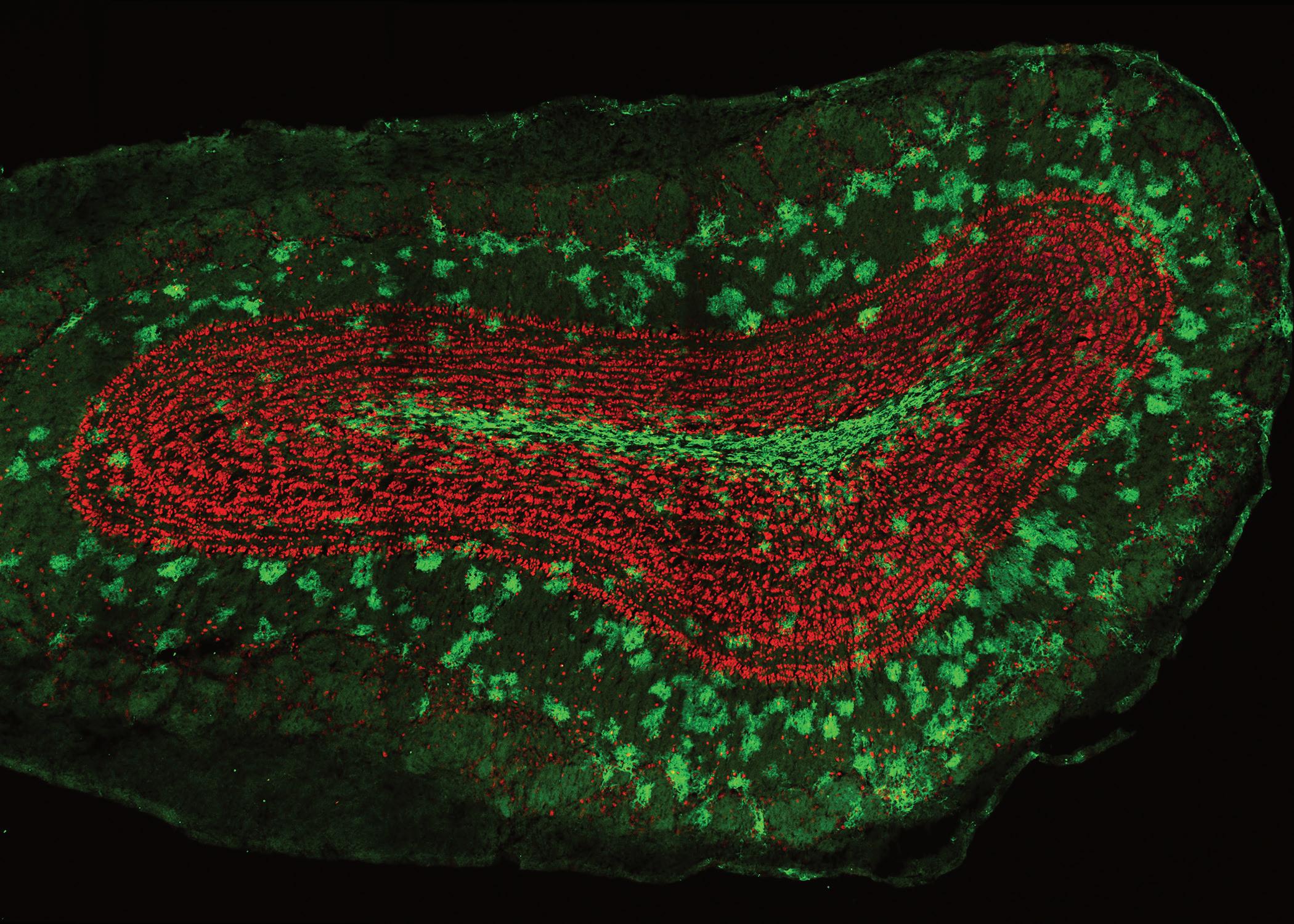
1 Looking Ahead
MARK D. MARKEL
Dean
RICHARD BARAJAS
Assistant Dean for Diversity, Equity, and Inclusion
FARIBA KIANI-ANARAKI
Chief Financial Officer
LYNN MAKI
Associate Dean for Student Academic Affairs

NANCY PARKINSON
Assistant Dean for Human Resources & Payroll
PEGGY SCHMIDT
Associate Dean for Professional Programs
CHRISTOPHER SNYDER
Associate Dean for Clinical Affairs
MARULASIDDAPPA SURESH
Associate Dean for Research & Graduate Training
KRISTI V. THORSON
Associate Dean for Advancement & Administration
LAUREN TREPANIER
Assistant Dean for Clinical & Translational Research

2023 ANNUAL REPORT
KRISTEN BERNARD, Pathobiological Sciences
2 Training Future Veterinarians
NIGEL COOK, Medical Sciences
GILLIAN MCLELLAN, Surgical Sciences
JYOTI WATTERS, Comparative Biosciences
Editorial Staff
WRITING, EDITING
Gian Galassi, Publications & Media Relations Manager
DESIGN, PRODUCTION

Kelly Bird, Creative & Marketing Manager
PHOTOGRAPHY
Meghan Lepisto, Seth Moffitt
CONTRIBUTING WRITERS
Meghan Lepisto, Britta Wellenstein
The UW School of Veterinary Medicine uses gift funds to produce its publications.
To donate to the school, contact:
PAT BOWDISH
Associate Vice President & Managing Director
pat.bowdish@supportuw.org
(608) 332-4750
HEIDI KRAMER
Senior Director of Development

heidi.kramer@supportuw.org
Learn more about the ways the UW School of Veterinary Medicine is advancing animal and human health: vetmed.wisc.edu

(608) 327-9136 CONTENTS
4 Delivering Compassionate Care
5 Innovation to Invention
6 Fostering New Scientists & Discoveries
8 Creating a Welcoming Community
10 Furthering the Wisconsin Idea
12 Advancing the School
uwveterinarycare.wisc.edu
animalsneedheroestoo.com
This report is also available online at www.vetmed.wisc.edu/annual-reports
©2023 Board of Regents of the University of Wisconsin System
14 Recognition of Service
15 Recognition for Excellence

The school continues to make significant progress in its ongoing endeavor to develop a modern DVM curriculum.

The revised curriculum integrates foundational sciences and clinical sciences, providing our students with a more authentic and seamless education that will prepare them to be nimble problem solvers and highly competent practitioners. Our faculty members are committed to educational excellence, and in addition to their day to-day work as researchers, clinicians, and educators, dedicate valuable time and resources to our revision efforts.
In essence, our faculty are crafting a curriculum, grounded in evidencebased practice and educational science, that will empower our graduates to enter the veterinary profession with increased confidence and competence from their very first day.
This past year faculty have developed student learning outcomes that guide the organization of the curriculum for the first two years of the DVM program organized around body systems and integrating disciplinebased content with clinical applications. Faculty are currently engaged in designing courses, aligning appropriate topics and learning activities to ensure students are poised to meet those outcomes. We are well on track to welcome the class of 2029 into the inaugural year of the revised curriculum in fall of 2025.
“We’re working toward developing students to meet the diverse needs in the veterinary profession by fostering curiosity and scientific thinking in parallel with day one ready clinicians.”
- ELLISON BENTLEY, DVM, DACVOClinical Professor, Clinical Opthalmology
The School of Veterinary Medicine is committed to training future veterinarians who will successfully contribute to health and wellbeing through a range of career opportunities in the profession.
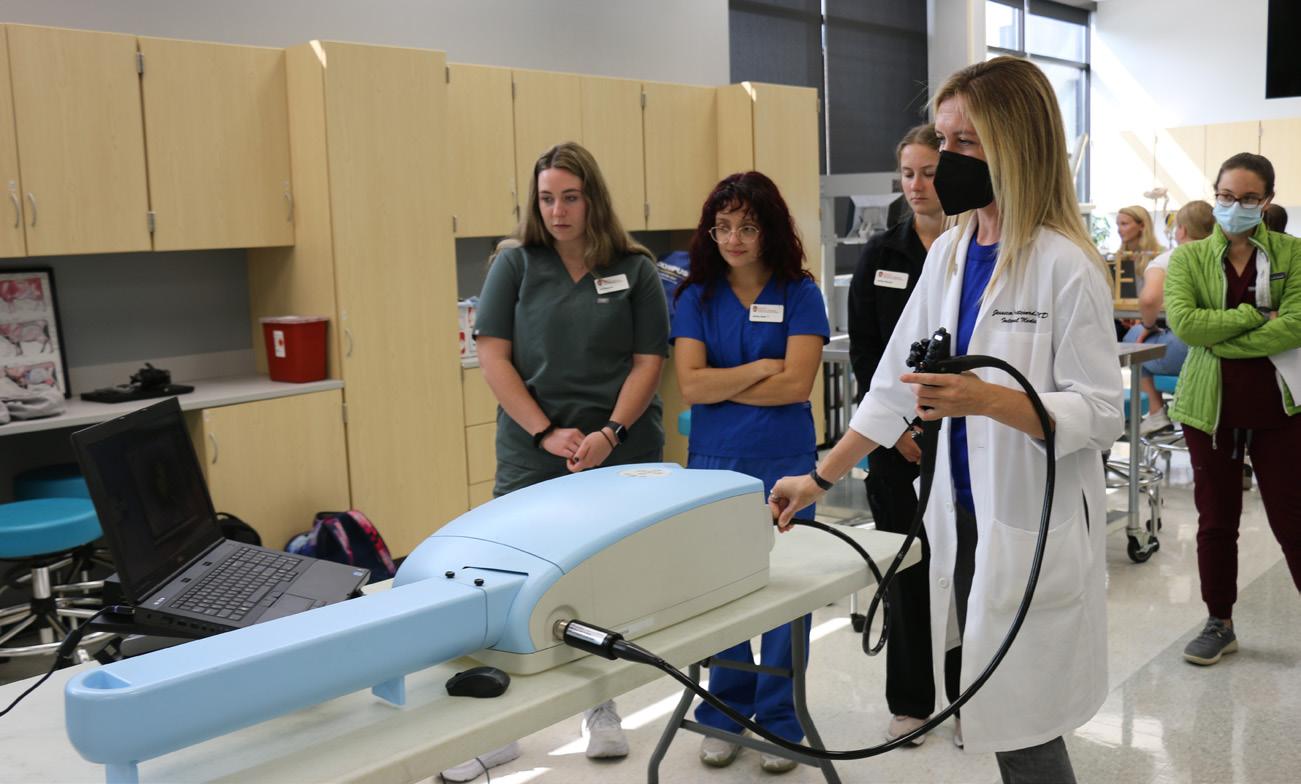
In 2022-23, our students were recognized for a variety of accomplishments, from their group efforts to make our profession more welcoming and inclusive to their individual research on issues related to animal welfare and environmental sustainability. Additionally, our staff and instructors continue to find new ways to inspire, teach and support the entire student body so they may thrive while they are with us and long after they leave.
The UW SVM chapter of Veterinarians as One Inclusive Community for Empowerment (VOICE) was awarded the organization’s National Programming Excellence Award for 2022-23. This national student-run organization aims to increase awareness, sensitivity and respect for differences among all individuals and communities in the field of veterinary medicine. Each year, the UW VOICE chapter hosts events, often in collaboration with other UW School of Veterinary Medicine or campus organizations, to explore topics ranging from equity in the health sciences to mental health, disabilities, antisemitism, and more.
UW VOICE Executive board members Krista Li, xDVM’25, Stephanie Yopp, xDVM’25, and Allie Hoerth, xDVM’24, with the 2022-23 VOICE National Programming Excellence Award.
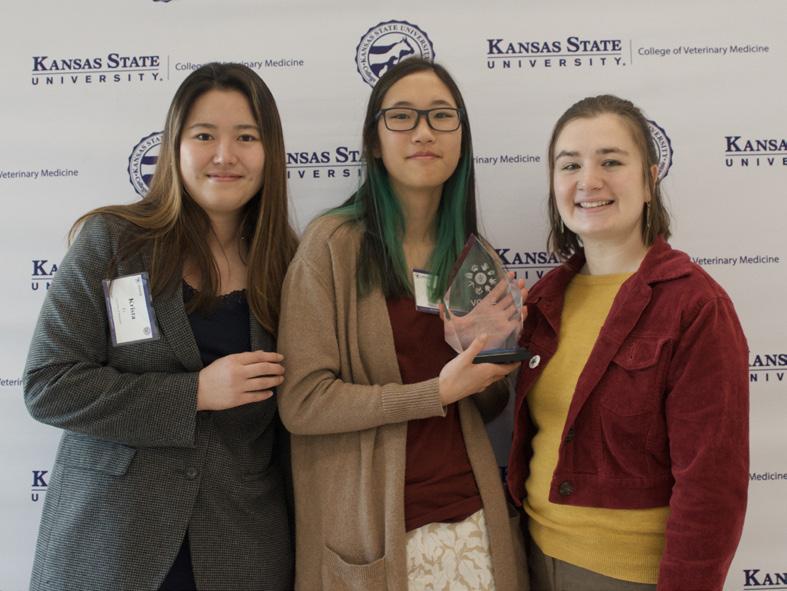
Three SVM students were selected by the Foundation for Food & Agriculture Research (FFAR) and the American Association of Veterinary Medical Colleges (AAVMC) for highly competitive Veterinary Student Research Fellowships (FFAR Vet Fellows). Kailey Wichman and Madeline Zutz completed their fellowships in 2022 while Lauren Cromwell will begin her fellowship this fall. These unique fellowships create opportunities for veterinary students around the world to conduct research to advance global food security, sustainable animal production and environmental sustainability.
Twelve new technologies were added to the Maeck Clinical Skills Training Center — an inviting state-of-the-art teaching space that allows members of the SVM community, including students and clinicians, to get more hands-on training in core clinical skills. Among the new equipment added this year are improved life-sized cow and horse models, an endoscope training tool and a 3D molding device. These models and machines help students and faculty practice crucial technical veterinary medical skills and become more confident in their talents. The purchase of the new equipment was made possible by a gift from the William J & Shirley A Maeck Family Foundation, which over the years has provided numerous gifts to enhance and modernize our ability to train the next generation of veterinarians.
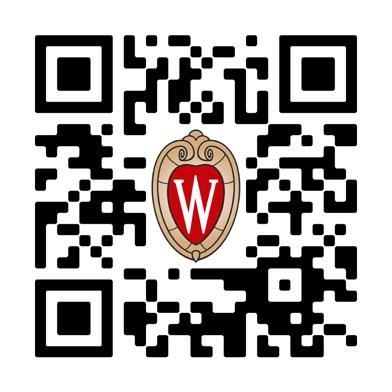
Dr. Elizabeth “Liddy” Alvarez, clinical assistant professor, was honored with the American Association of Veterinary Medical Colleges (AAVMC) Distinguished Veterinary Teaching Award, the most prestigious teaching award in veterinary medicine. Her passion for teaching has inspired countless students over the years and is representative of the commitment that all our faculty have toward ensuring the future of our profession is in good hands.

Listening to lectures and reading textbooks will always have a place in veterinary medical education, but research shows that employing more interactive learning opportunities improves student engagement and outcomes. SVM Clinical Instructor McLean Gunderson has been helping colleagues at the school incorporate active learning into multiple aspects of their courses by creating a variety of anatomically oriented teaching models that help bring concepts and clinical techniques to life. Using their own imagination, creativity, and technical skills, Gunderson uses pourable plastic or household materials to create 2D or 3D representations of concepts that are otherwise difficult to understand from a lecture or book chapter alone. As a result, students not only gain a clearer contextual understanding of anatomy but also a more realistic model on which to practice technical skills. For example, some models allows students to practice techniques to stabilize veins, withdraw blood and place IV catheters from tubes filled with red liquid, while others, like silicone castration models, allow students to practice full spays and neuters, from scrubbing and draping to suturing. The models can also be placed inside a stuffed animal dog or cat to provide a new level of complexity to the procedures, which better prepares them to perform surgical procedures on live animals in their third year of veterinary school.
* includes those with no DVM debt, total educational debt
$3,028
$2.1M AVERAGE SCHOLARSHIP AWARD*
TOTAL SCHOLARSHIP DOLLARS*


*includes general and off-cycle scholarships, tuition revenue scholarships, Advanced Opportunity Fellowship scholarships, and Board of Regents Trust Scholarships.
$120,668 $139,325
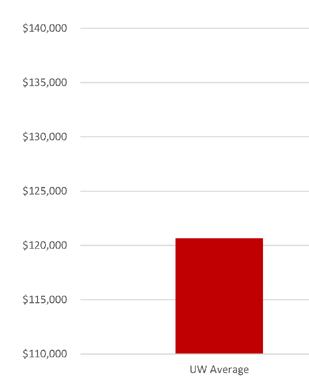
13%
100% OF SCHOLARSHIP APPLICANTS RECEIVED AID LOWER THAN THE NATIONAL AVERAGE
•
•
• Biochemistry
• Bioengineering
•
• Integrative biology
• Molecular biology
• Physics
• Political science
• Psychology
•
•
• Dance
• Ecology
• Electrical engineering
•
* Includes lab animal medicine, shelter animal medicine, avian/exotics, and undecided areas of interest.
•

Canine - 20,301
Feline - 4,686

Our clinicians, fourth-years students and staff consistently receive exceptional feedback from clients not only about their medical knowledge and technical skills but their unequaled compassion and professionalism as well.
Equine - 881

Avian - 715
Lapine - 744


Bovine - 259


Other* - 1,099
*includes Rodentia, Reptile, Porcine, Mustelidae, Camelid, Insectivora, Caprine, Marsupial, Ovine, Primate, Fish, Amphibian, and other mammals.
UW School of Veterinary Medicine cardiologists learned a new, lifesaving technique thanks to support from UW Veterinary Care client Jerry Falci. Falci’s labradoodle, Jet, was diagnosed in 2018 with pulmonic stenosis and underwent two procedures at UW Veterinary Care to improve blood flow and decrease stress on his heart. Jet saw some improvements but experienced a serious setback in 2022, leading his veterinarians to suggest more advanced care, specifically transpulmonic stents.
Designed to improve blood flow, transpulmonic stents have been used in human patients for some time, but there are limited veterinary medical institutions that specialize in the procedure. After learning this, Falci was inspired to make a gift to the UW School of Veterinary Medicine’s Cardiology Greatest Needs Fund so that SVM cardiologists could learn the procedure and teach others at the school. Last December, Sonja Tjostheim, clinical assistant professor of cardiology, and SVM cardiology residents Kelly Flynn DVM’18 and Graham Rossi worked alongside a veterinary cardiologist who traveled from Georgia to UW to perform the procedure on Jet. The procedure proved immensely beneficial, with the stent allowing for improved blood flow across Jet’s pulmonary valve. But the benefits of Falci’s generosity and foresight extend well beyond his own dog.

Tjostheim has since attended a course on the procedure and has brought her new expertise back to the SVM, where she is sharing and applying the knowledge to help more dogs like Jet across Wisconsin, the Midwest and beyond.

This year, UW Veterinary Care clinicians provided excellent care to nearly 29,000 patients, big and small.
They [UWVC] see hundreds of people with their sick pets and they always remember us and treat us like we are the only clients in the world.
- KATIE -
“
Since 2010, faculty, staff and students at UW School of Veterinary Medicine have received more than 100 patents for their innovative solutions and inventions, including the discovery of new or improved processes, compositions (for example, new materials or drug molecules) or devices.
It’s another example of how innovative research at the SVM is making a difference in the world by bringing transformative discoveries to market and, eventually, in service to the public good.
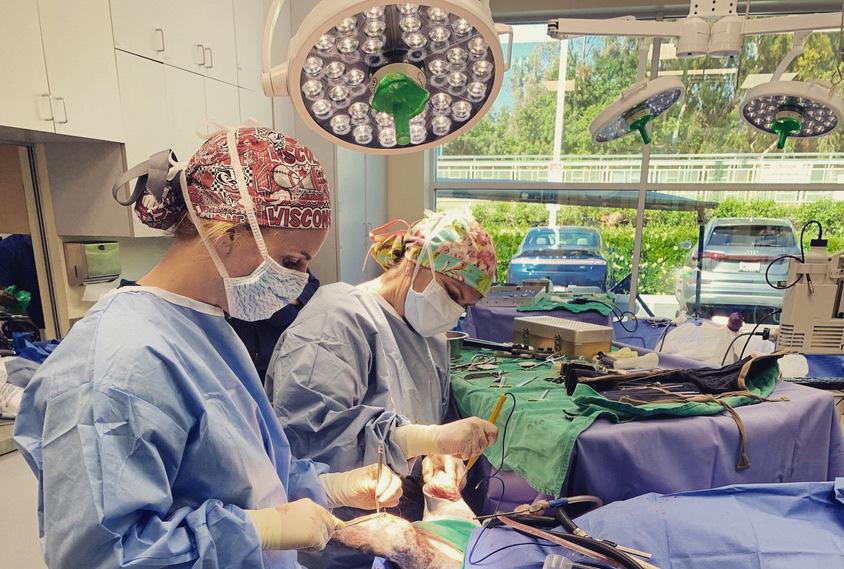

When Zach Meyers DVM’22 enrolled in the Artificial Intelligence in Veterinary Medicine class as a fourth-year student, he had no idea it would one day turn into a business. But the class, taught by Dorte Dopfer, helped Meyers gain skills in basic computer practices and fundamentals of machine learning that turned the budding veterinarian into an aspiring entrepreneur. The application he built in class eventually hatched a company Meyers cofounded called Vetreum, which aims to use artificial intelligence to carry out timeconsuming and often expensive tasks in more efficient and affordable ways. Building on the project Meyers first started in his coursework at the SVM, Vetreum has since created an automated analyzer that identifies and counts parasite eggs faster and allows more clinics the ability to perform fecal floats, an often time-consuming and costly task. Using computer vision technology, the fecal float application can locate eggs almost as well as top-of-theline software, but at a much lower price point. Other projects Vetreum is working on include a more efficient method of scanning microscope slides using smartphones, a white blood cell classifier, and image stitching technology. Meyers’ progress with Vetreum earned him the 2022 Merck Animal Health Veterinary Student Innovation Award, which recognizes innovation, entrepreneurship, and creative forward thinking.

Annie Pankowski DVM’23 never expected to add co-founder of a tech startup to her list of accomplishments. However, during the pandemic, veterinarians noticed a sharp increase in demand for their services and strained to find ways to maximize the efficiency of their staff and referral management systems. So, Annie and her sister Ali founded Transfur, Inc., a platform that allows veterinarians to request, send and review the medical records of animals that have received care from other clinics through a business-to-business software model that uses artificial intelligence to extract relevant information from an animal’s previous medical history. Annie and her sister envision it being used by a variety of veterinary professionals, including specialists, primary care providers, and care coordinators.

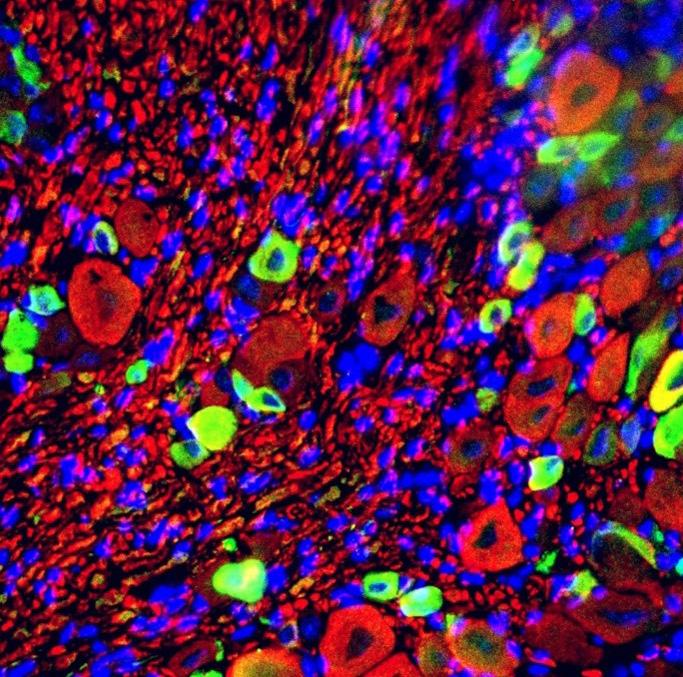

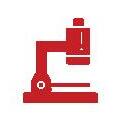
The Comparative Genetics and Orthopedic Research Laboratory (www.vetmed.wisc. edu/lab/corl/), co-directed by faculty members Peter Muir and Susannah Sample MS ‘07, DVM ‘09, PhD ‘11, recently developed the first genetic screening tool of its kind for cruciate ligament rupture in Labrador Retrievers (a breed with unusually high risk for developing the disabling condition) and another genetic test in the works for a different condition common to Labradors, laryngeal paralysis. These new diagnostic tools will not only help dog breeders avoid carriers or individuals with high genetic risk but they also benefit dog owners, who can seek personalized care or preemptive treatment if they discover their dog will likely develop these disabling conditions. This research may also help genomic researchers advance discoveries in human-equivalent diseases.

In a world still reeling from COVID-19, infectious disease researchers are eager to head off the next pandemic before it has the chance to spill over from animals to humans. Tony Goldberg, professor of pathobiological sciences, and a group of his colleagues are studying how simian hemorrhagic fever virus (SHFV) and its family of simian arteriviruses could pose a significant health risk to humanity should the right conditions allow it to leap from wild primates to people and recently demonstrated the virus’s ability to infect human cells and deftly evade the human immune system’s typical responses. The researchers say there is no known risk to people now, and there is no guarantee the virus will make the jump from wild primates, but the research is crucial to understanding these viruses and the risks they could pose.
Professors Ted Golos, Joan Jorgenson DVM ‘93, Rob Lipinski PhD ‘08, and Chad Vezina (Department of Comparative biosciences) are revealing new insights into disorders affecting millions of people, including placental biology relevant to human health, pregnancy, and fetal wellbeing (Golos); female and male ovary and testis development and adult reproductive diseases (Jorgenson); how genetic and environmental factors interact to cause birth defects of the face and brain, to develop prevention strategies (Lipinski); and the cellular anatomy of the prostate and urinary tract, informing new treatments for urinary dysfunction and prostate cancer in aging male people and pets (Vezina).
It’s long been known that ticks’ and mosquitoes’ microbiomes (the whole community of bacteria that live in them) can significantly influence whether or not those insects can transmit various diseases to animals and people, but somehow flea-borne pathogens had escaped that same level of scientific inquiry and understanding. Until now.
Erin Lashnits, clinical assistant professor of small animal internal medicine, recently collaborated with colleagues at North Carolina State University to examine the microbiome of fleas found on freeroaming cats that were being treated at community Trap-Neuter-Release programs.

During their study, Lashnits’ team found three different bacterial genera that were common in all the fleas: Bartonella, Rickettsia and Wolbachia—the first two of which can cause disease in humans and cats. Next steps in her team’s research will include comparing the pathogens they’re finding in the fleas to the pathogens they’re finding in cats, and then, ultimately, in humans, which could lead to insights on how best to break the transmission cycle between species.

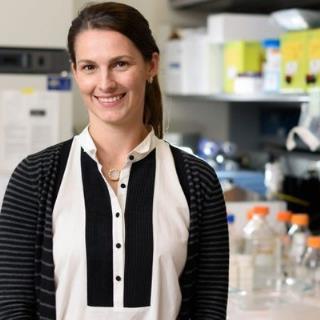
SVM professor Masatoshi Suzuki is working with colleagues across campus to help “grow’ the science behind the burgeoning field of cultivated meat using stem cell processes similar to what are used to develop regenerative therapies in human medicine.
Cultivated meat has the same cell arrangement and structure as normal muscle meat, including similar flavor, texture, and nutrition, but without the need to raise farm animals.
To grow cultivated meat, Suzuki and colleagues start by isolating adult muscle cells from postmortem cow or pig tissues and then create induced pluripotent stem cell lines. These cells are then grown in a bioreactor, where they increase in culture size, and are then seeded in a biological scaffold--a small culture platform that acts as the infrastructure to help the cells grow into a 3-D shape. Different types of cells are cultured together, forming primarily fat and muscle cells to produce the right “meat” makeup and texture.
Although some people are wary of cultivated meat, researchers say it has the potential of addressing a variety of environmental concerns, including the mitigation of environmental impacts from large scale meat production, meeting the food demands of a growing global population, and potentially serving as a substitute when disease in livestock causes supply chain impacts, like what happened during the coronavirus pandemic and spikes in avian influenza.
Lia Spencer, DVMx24, is the first recipient of the newly established Pan-Asian Veterinary Medicine Scholarship. Tim Yoshino, a professor emeritus with the school, and his wife Laureen Yoshino, a special education teacher and elementary school librarian in the Madison School District, established the scholarship in 2022 to help increase and support diversity in the veterinary medical profession. The scholarship recognizes one recipient annually who represents “strong interest and commitment to veterinary medicine.”

Preference is given to applicants who are members of the Association of Asian Veterinary Medical Professionals (AAVMP) of UW–Madison and demonstrate commitment to or interest in one or more Pan-Asian countries and cultures.

Spencer exemplifies these standards. She is the senior delegate of the UW–Madison chapter of the Student American Veterinary Medical Association (SAVMA), vice president of the university’s AAVMP chapter, and the veterinary medicine program representative for UW–Madison’s Student Interprofessional Health Council. She also holds a certification in diversity and inclusion in veterinary medicine from Purdue University and previously served as chair of the Equity in Veterinary Medicine Grant for SAVMA’s Integrative Communications and Diversity Committee.
Ruthanne Chun co-authored a paper in the Journal of the American Veterinary Association: “Can veterinary medicine improve diversity in post-graduate training programs? Current state of academic veterinary medicine and recommendations on best practices.” The article highlights holistic approaches, some of which are incrementally being incorporated into the Veterinary Intern Resident Matching Program application, that emphasize selection criteria that focus on building a more resilient workforce.

These include expanding candidate assessment beyond grades and class rank into a more standardized method for screening candidates that includes consideration of life experiences and talents outside of veterinary medicine. Chun also led a school-wide discussion on the topic in June 2023.
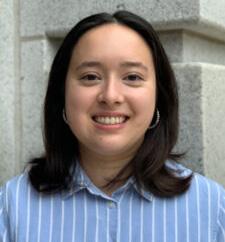
The UW School of Veterinary Medicine continues to make strides in creating a culture of diversity, equity, and inclusion.
“
Visibility is so important in any profession, but especially in this profession. I am excited for future recipients of this scholarship who are doing significant work in making this profession more diverse.”
LIA SPENCER, DVMx24Tim and Laureen Yoshino established the Pan-Asian Veterinary Medicine Scholarship in 2022. Photo Credit: Provided by Yoshino Family Photo Credit: Provided by Lia Spencer
It’s no secret that being a veterinarian is an incredibly rewarding career, but the profession is not without its share of stressors, including caring for ailing animals, compassion fatigue, and financial stress over student loans. The UW School of Veterinary Medicine is part of a global effort to take a more comprehensive look at the care and needs of all of its faculty, staff and students by offering more mental health awareness and well-being services to those who might need them.
In 2022, the school hired Rhonda Nichols to serve as its first licensed clinical social worker whose job it is to equip current and future veterinarians with effective tools to approach stressful situations, particularly when a social worker may not be present. This position helps move the school and hospital towards a more supportive culture for those who are not only learning about, but delivering, compassionate veterinary medical care for patients and clients at our hospital and in our communities.

The 2022-2023 academic year was the inaugural year for the Diversity, Equity and Inclusion Advocate program. Each DVM class year had student representatives who focused on two key areas.
The first was to increase community engagement within the DVM classes. This was done by hosting a potluck with cultural dishes that students provided. These events created a relaxing environment to meet students from other class years and share a meal.
The second was to hold regular voluntary meetings for students to explore and discuss various DEI issues. These discussions were student led and all students were welcome to participate. In the coming year the DEI Advocates are looking to get faculty more involved in these activities.
An innovative new training initiative designed to bridge the gap between an undergraduate and doctoral degree program for students underrepresented in academic research, including racial minorities, people with disabilities, or students from a low socioeconomic status, is driving transformative change in the biomedical sciences and aims to diversify the PhD workforce specific to academic research.
Now entering its second year, the UW-Madison Postbaccalaureate Research Education Program (PREP), led by SVM professor Joan Jorgenson DVM’93, welcomes a small cohort of exceptional scholars who have earned their bachelor’s degrees and are looking to pursue doctoral degrees in biomedical science.
Over the course of a year, PREP offers scholars a rigorous research experience, enhancing their graduate program applications and refining their research interests. PREP also delivers wide-ranging professional development opportunities and individualized mentorship, tailored to equip participants with the necessary tools for success in PhD programs. UW PREP is funded by a $250,000 grant from the National Institutes of Health (NIH) with matching funds from the School of Veterinary Medicine, School of Medicine and Public Health, College of Agricultural and Life Sciences, and the Graduate School. This collaborative, campus-wide effort aims to diversify the PhD workforce specific to academic research.
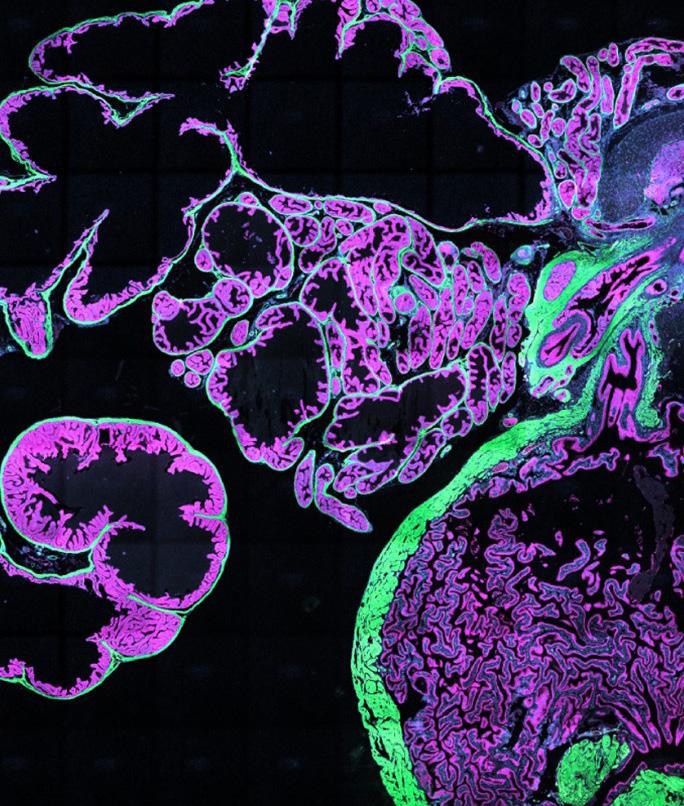
One of the 2022-23 scholars, Alaina Houghton-Chamberlain BS’22, works in the Jorgensen lab at the School of Veterinary Medicine. She says her mentors helped her see herself and her contributions to science in ways she hadn’t before.
“I’ve made so many amazing relationships with the facilitators in the program, and I know they will continue to be amazing resources long after I’ve finished the PREP program.” This fall, Houghton-Chamberlain will have a chance to put her newfound skills to the test as she pursues her PhD in the Endocrinology and Reproductive Physiology program at UW-Madison.
Alaina Houghton-Chamberlain works alongside Joan Jorgenson, DVM as part of PREP - a new training initiative aimed at diversifying the academic research workforce. vetmed.wisc.edu

I feel like a real scientist, more so than I ever have before, and I am so grateful to the PREP program for showing me that I am a capable scientist and helping me share my work with the world.”
ALANA HOUGHTON-CHAMBERLAINPhoto Credit: Seth Moffitt Photo Credit: Meghan Lepisto

The Wisconsin Idea – the principle that education should influence people’s lives beyond the boundaries of the classroom – guides the school’s work in education, research, and patient care.
Nearly 3,400 degrees have been earned by the graduates of our Doctor of Veterinary Medicine program; PhD and MS graduates of our Comparative Biomedical Sciences program; PhD and MS graduates of the Veterinary Science program, the precursor to the School of Veterinary Medicine; and College of Agricultural and Life Sciences Veterinary Science graduates holding a combination of these degrees. Over half of our living alumni reside in Wisconsin, while the remainder are spread across the United States and the world, residing on all continents except Antarctica.
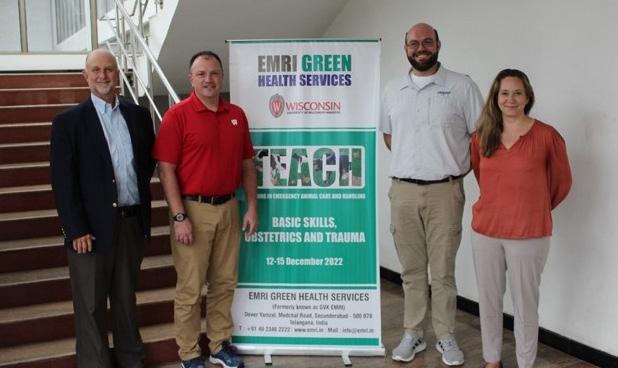
In December 2022, UW School of Veterinary Medicine faculty offered a first-of-its-kind training program for Emergency Management and Research Institute (EMRI) veterinarians in Hyderabad, India, called TEACH (Training in Emergency Animal Care and Handling). SVM Emeritus Professor Christopher Olsen, Assistant Professors Keith Poulsen and Ryan Breuer and Adjunct Assistant Professor JR Lund led the training, which consisted of didactic, case-based, laboratory and on-farm training for 22 EMRI veterinarians from around India. Topics included fluid therapy, blood transfusions, calving and calf management, dystocia, metritis, transfer of passive immunity, vaccinology, musculoskeletal trauma and physical examination, as well as One Health, zoonotic influenza and lumpy skin disease.
Future goals for the TEACH program include: Instituting monthly virtual case rounds with EMRI and SVM veterinarians; building a library of video lectures on clinical care and zoonotic disease topics; yearly or biannual in-person training of EMRI veterinarians and paraveterinarians in India by SVM veterinarians; assisting EMRI in designing an on-site teaching herd and veterinary medical clinical skills and simulation center.
What started in 2013 as a humble idea to provide subsidized veterinary care to houseless pet owners in Madison, WI has since grown into an innovative educational model that teaches cultural humility and competency to the next generation of veterinarians while simultaneously addressing the social crisis of homelessness and its attendant challenges. WisCARES (Wisconsin Companion Animal Resources, Education, and Social Services) provides subsidized veterinary medical care, housing support and advocacy, and other social services to Dane County pet owners who are low-income or experiencing homelessness or housing insecurity. It’s a holistic approach to care that embodies not only the One Health philosophy that humans, animals and their environment are inextricably linked, but also the Wisconsin Idea, a major pillar of UW–Madison’s mission of reaching beyond campus borders to improve people’s lives.
For SVM students, WisCARES serves as an ideal learning environment. Through a combination of experiential learning in a low-resource veterinary medical environment and opportunities for facilitated self-reflection, students learn how cultural humility and competency can play an important role in improving health outcomes for humans and animals alike—skills that the American Veterinary Medical Association (AVMA) now recognize as required educational competencies and which also align with the school’s spectrum of care model.
Since the program’s inception 10 years ago, more than 250 veterinary students have completed a WisCARES rotation, working alongside peers from other academic disciplines to not only consider social determinants of poverty and health, but to reflect on their own world views and learn how to provide the highest level of care to people and their pets, regardless of their cultural and socioeconomic backgrounds.
WisCARES recently celebrated its 10th anniversary, and the program continues to seek new ways to improve the lives of people and their pets by increasing veterinary medical trainees’ clinical experience, professional communication skills, compassion, and understanding, all of which equips them to become not just great veterinarians but agents of positive systematic change around the world.
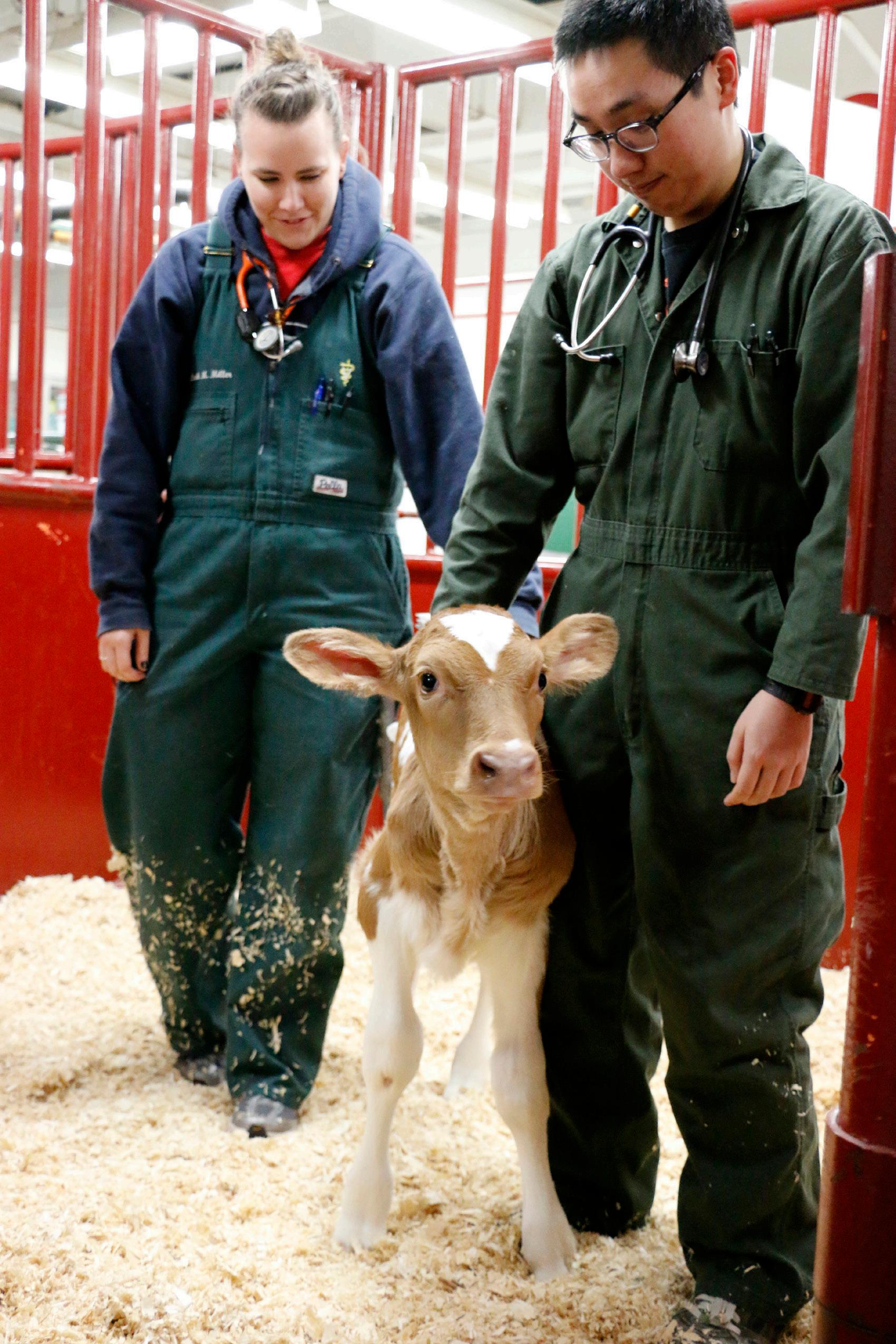
The Dairyland Initiative (DI) was developed by SVM scientists to help optimize dairy cattle health, performance, and wellbeing, and is constantly evolving to meet the industry’s latest challenges across Wisconsin, the country, and the world. Recent highlights of the DI’s work include research collaborations with colleagues in Finland on labor efficiency and the importance of barn design in robotic milking systems, the development of on-farm and virtual workshops to train people how to assess existing ventilation and cooling systems to help cows handle hotter climates, and the training of veterinarians to perform diagnostic lung ultrasound to identify pneumonia in young calves so farmers can improve existing housing and use antimicrobials in a safer and more targeted manner.
Most recently, the DI supported the development of a new tablet-based game that aims to revolutionize how on-farm workers are trained to move cows in a safe and stress-free manner. This app will join a suite of other diagnostic and decision support apps developed by the DI, which are available for smartphones and tablets in English, Spanish, French, and German.
vetmed.wisc.edu
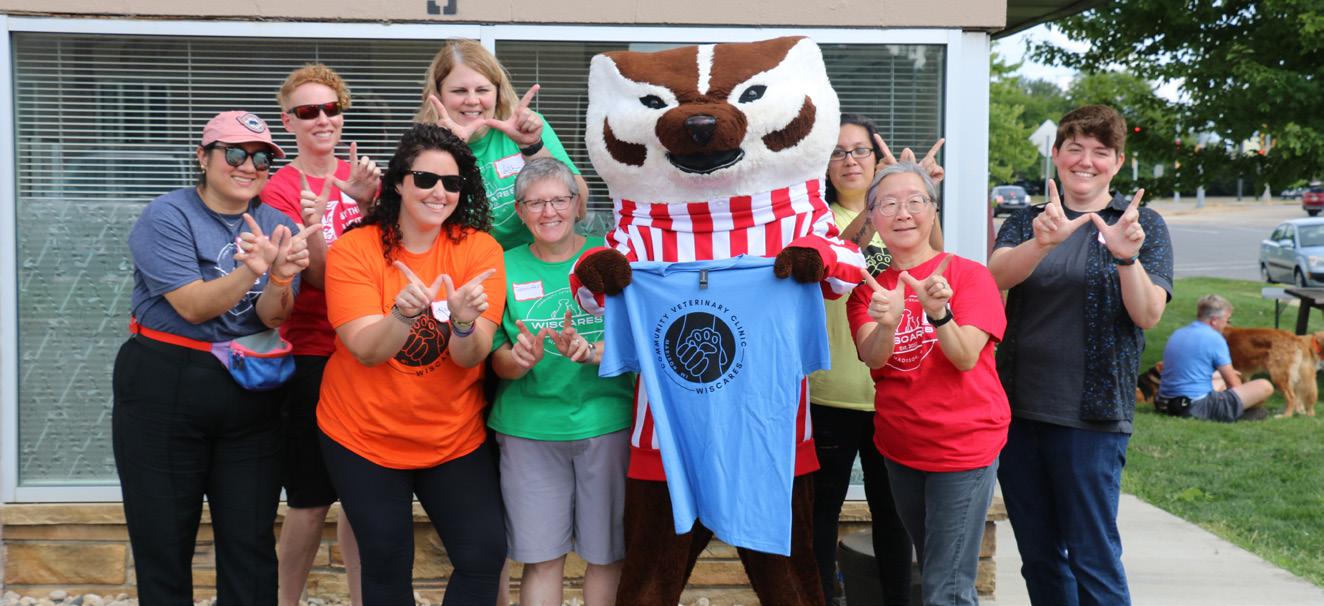
Gifts from generous donors, including animal lovers, hospital clients, alumni, clinic sponsors, community members, and more, allow us to continue our mission of advancing the health of animals and people alike.
Across the 2022-23 fiscal year, the school received $14.2 million in new gifts and pledges — including $8.8 million in new estate gift commitments, and $1 million in new discretionary support gifts. These contributions represent gifts of all sizes and from donors of all walks of life, all helping to make our work possible.
$14.2M
TOTAL NEW GIFTS AND PLEDGES (2022-23)
The support of our donors allows us to recruit the most outstanding faculty and students, make critical advances in research, purchase state-of-the-art equipment for UW Veterinary Care and our teaching spaces, and provide financial assistance to our students to set them up for success after they graduate.
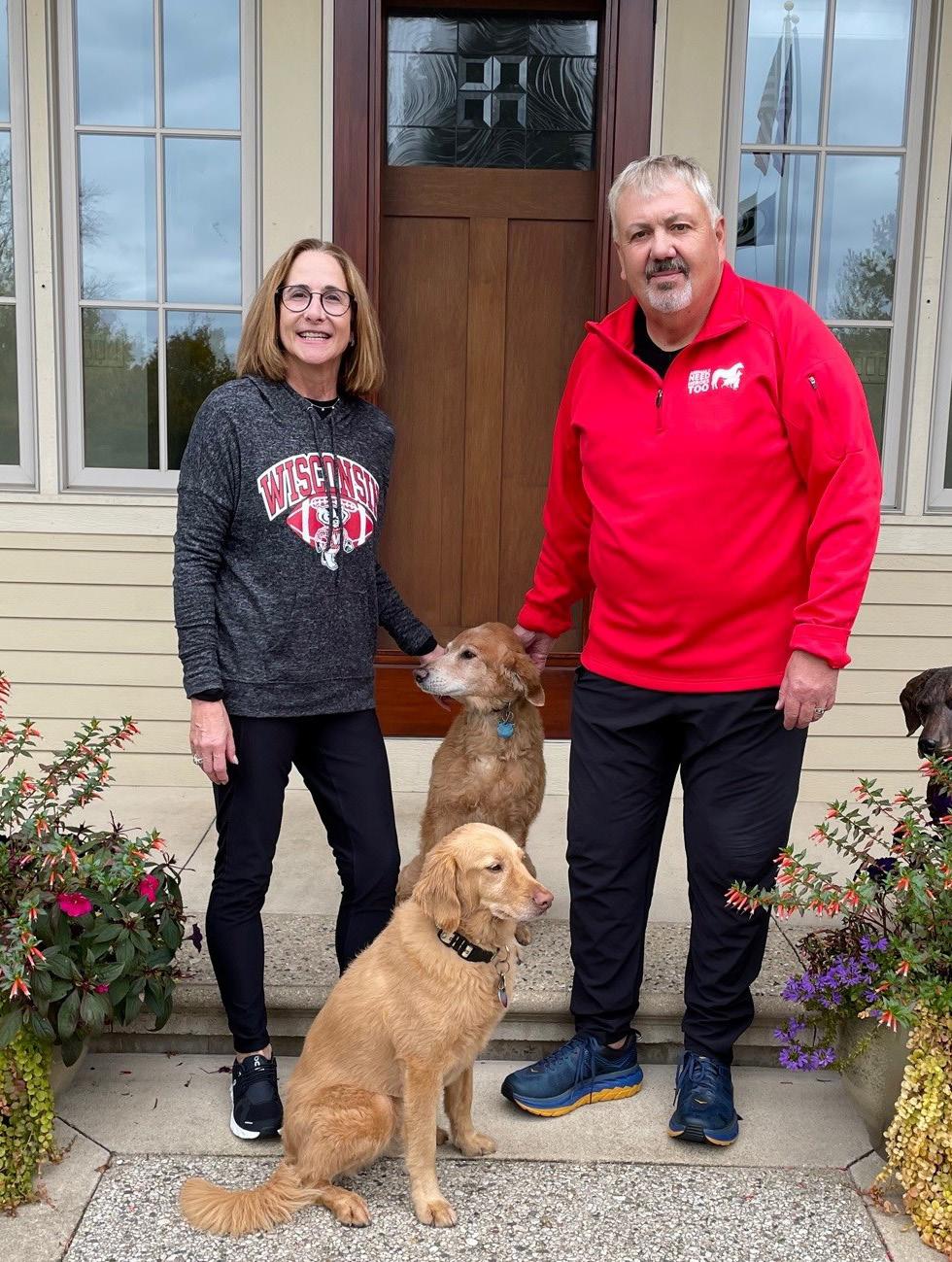
Long-time SVM friends and supporters Tim and Nancy Speaker provided a $500,000 commitment in November 2022 to support the building expansion campaign. Their generosity launched the “Speaker Match,” a dollar-for-dollar matching gift program aimed to inspire other donors to contribute to the project.
We share a gracious thank you with all who make a difference. Your support enables us to train superb students, provide the highest level of clinical care, and make discoveries that advance understanding of animal and human health.
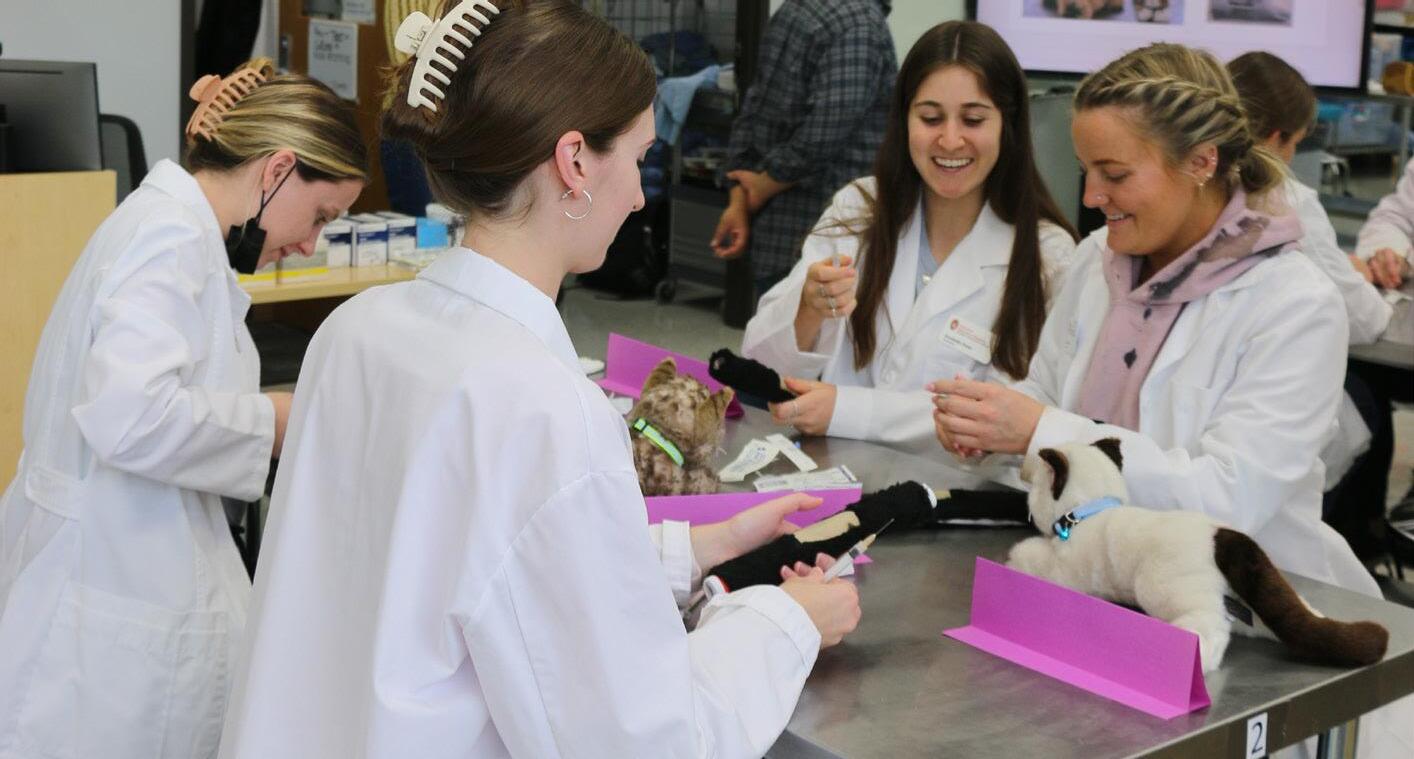
At the time of the Speaker’s commitment, the school was still approximately $5 million shy of what was needed to fully equip the project and complete the fundraising portion of the campaign. Thanks to the generosity of 17 donor families who took advantage of the opportunity, the Speaker Match was successfully completed in June 2023.


The SVM is grateful to Speaker family for their generosity and foresight, and to all donors who contributed not only to the Speaker Match, but to the entire fundraising campaign.

$8.8M
GIFT COMMITMENTS (2022-23)
NEW
3,200 TOTAL DONORS

238 NEW STUDENT SUPPORT GIFTS TOTALING $1.2 MILLION $1.6M SCHOLARSHIP ENDOWMENT INCREASE
6.6% ALUMNI GIVING PARTICIPATION
The Board of Visitors for the UW School of Veterinary Medicine serves as an external advisory body to the dean of the school.
Members of the board have attained prominence in their respective careers and are chosen because of their value in providing sound advice and counsel to the dean.
Read more about the board members at www.vetmed.wisc.edu/board-of-visitors
Tom Bach BBA’86, DVM’94*
Madison, Wisconsin
Nancy Ballsrud MBA’75
Minneapolis, Minnesota
John Baumann ’82 Monroe, Wisconsin
Debbie Cervenka
Santa Rosa Beach, Florida
Margo Edl
Middleton, Wisconsin
Patrick S. Farrell MS’83, DVM’87*
Russell, Pennsylvania
Charity Gottfredsen ’02, MS’07, DVM’07* Chicago, Illinois
Dan Grimm Waterford, Wisconsin
Peter Hanson MS’94, PhD’97* Boston, Massachusetts
Pam Jahnke Madison, Wisconsin
Carlton Jenkins MS’93, PhD’09 Madison, Wisconsin
Phil Jennings JD’93 Madison, Wisconsin
Diane Larsen ’80, DVM’90, PhD’99* Duluth, Georgia
Jeffry A. Neuenschwander ’82 Detroit, Michigan
Jill Pelisek Milwaukee, Wisconsin
Janet Raddatz
Plymouth, Wisconsin
John Schaefer ’81 Harshaw, Wisconsin
Suzy Shain BS’87, MBA ‘90
Verona, Wisconsin
Karl Solverson ’94, DVM’99*
Westby, Wisconsin
Karen Walsh ’81, MA’89
Madison, Wisconsin
Jeffrey R. Zuba ’81, DVM’87
San Diego, California

The Alumni Advisory Board enhances the school’s support of and relationship with alumni by providing input on alumni-related activities and communications and the best ways to keep alumni connected.


Tom Bach BBA’86, DVM’94
Holly Hovanec DVM’18
Diane Larsen ’80, DVM’90, PhD’99
Jennifer Lorenz DVM’09
Debra Olbrich DVM’07
Brad Poff DVM’87
Kathy Reilly DVM’90
Ann Sherwood Zieser DVM’90
Ty Vannieuwenhoven DVM’89
All degrees listed are earned from UW-Madison. * Indicates alumni of the UW School of Veterinary Medicine.
University of Wisconsin School of Veterinary Medicine
Each year, the school’s students, faculty, and staff earn numerous accolades in a wide variety of fields.
This is not a comprehensive list of awards and honors, only a representative sample from July 1, 2022 – June 30, 2023. More at go.wisc.edu/svm-awards-honors

John Svaren
2023-24 Vilas Associate, UW-Madison
Ruthanne Chun
2022-23 Outstanding Women of Color Awards, UW-Madison
Carrie Schroeder
2023 Non-UW [Health] Faculty Teacher of the Year, UW Department of Anesthesiology
Liddy Alvarez
2022 AAVMC (American Association of Veterinary Medical Colleges) Distinguished Veterinary Teaching Award
Chuck Czuprynski (emeritus professor)
2022 Wisconsin Association of Food Protection Leadership Award
Lisa Kim (DVMx’24)
2023 Merck Animal Health Diversity Leadership Scholarship
vetmed.wisc.edu
UW Veterinary Care
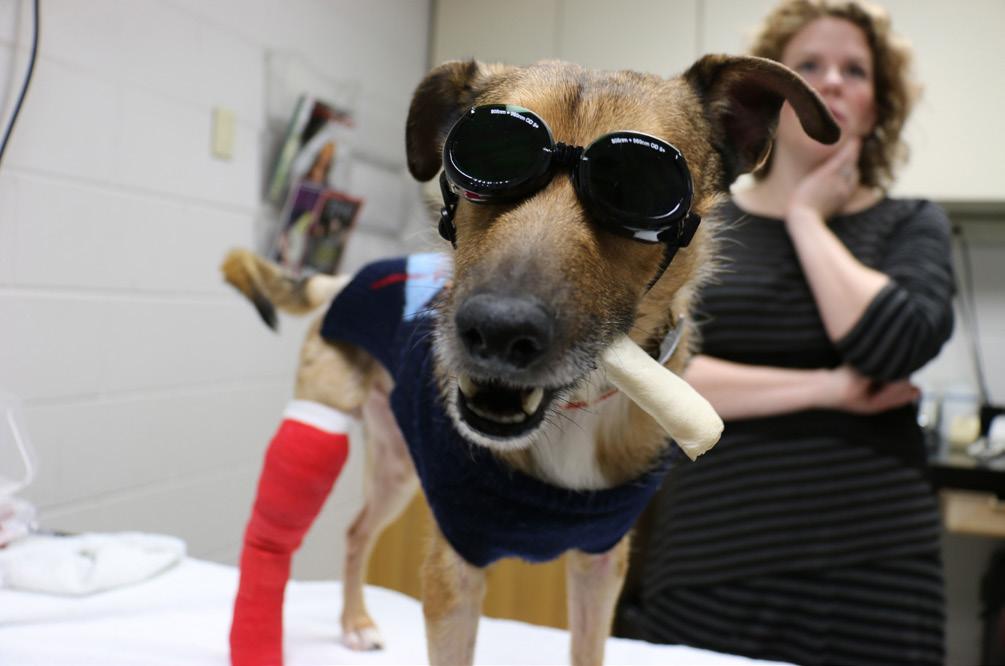
Best Veterinary Clinic in 2022 Madison.com People’s Choice awards

William Campbell
Distinguished Alumni Award, WFAA (Wisconsin Foundation and Alumni Association)
Yoshi Kawaoka
Wisconsin’s most influential Asian American leaders, Madison365
Shelby Williams
Outstanding Educator Award, Society of Veterinary Hospital Pharmacists
Rae McAtee, second-year small animal Internal Medicine resident
First place award for research poster, 2023
ACVIM (American College of Veterinary Internal Medicine) Conference
Freya Mowat
2023 Dr. Joe G. Hollyfield New Investigator Award for Macular Degeneration Research, Brightfocus Foundation
Emmett Swanton
First place presentation, Midwest Anesthesia Resident Conference
Kazuya Oikawa
National Glaucoma Research Post-Doctoral Fellowship award, BrightFocus Foundation
Mark Markel
President-elect, AO Foundation, the world’s largest orthopedic foundation
Richard Barajas
Chair of the AAVMC’s (American Association of Veterinary Medical Colleges) Diversity, Equity, and Inclusion Committee
Chris Snyder
President-elect, American Veterinary Dental College
Heidi Kramer
Member, AVAP (Association of Veterinary Advancement Professionals) 2023-2024
Executive Committee
M. Suresh
John E. Butler Professorship in Comparative and Mucosal Immunology (reappointment)
2015 Linden Drive Madison, WI 53706
New construction and renovations continue at the School of Veterinary Medicine. We are all looking forward to working in these spaces in 2024!
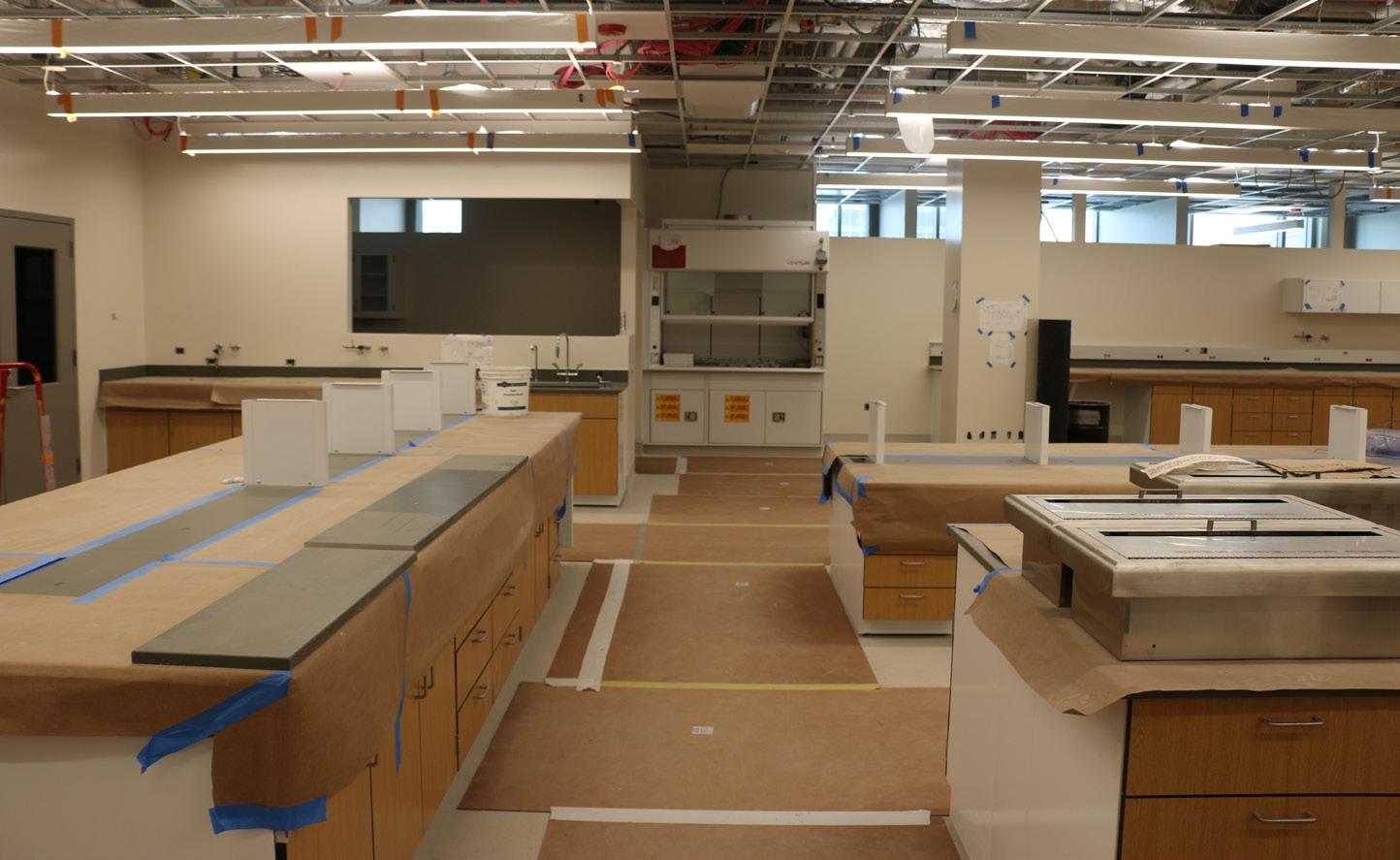
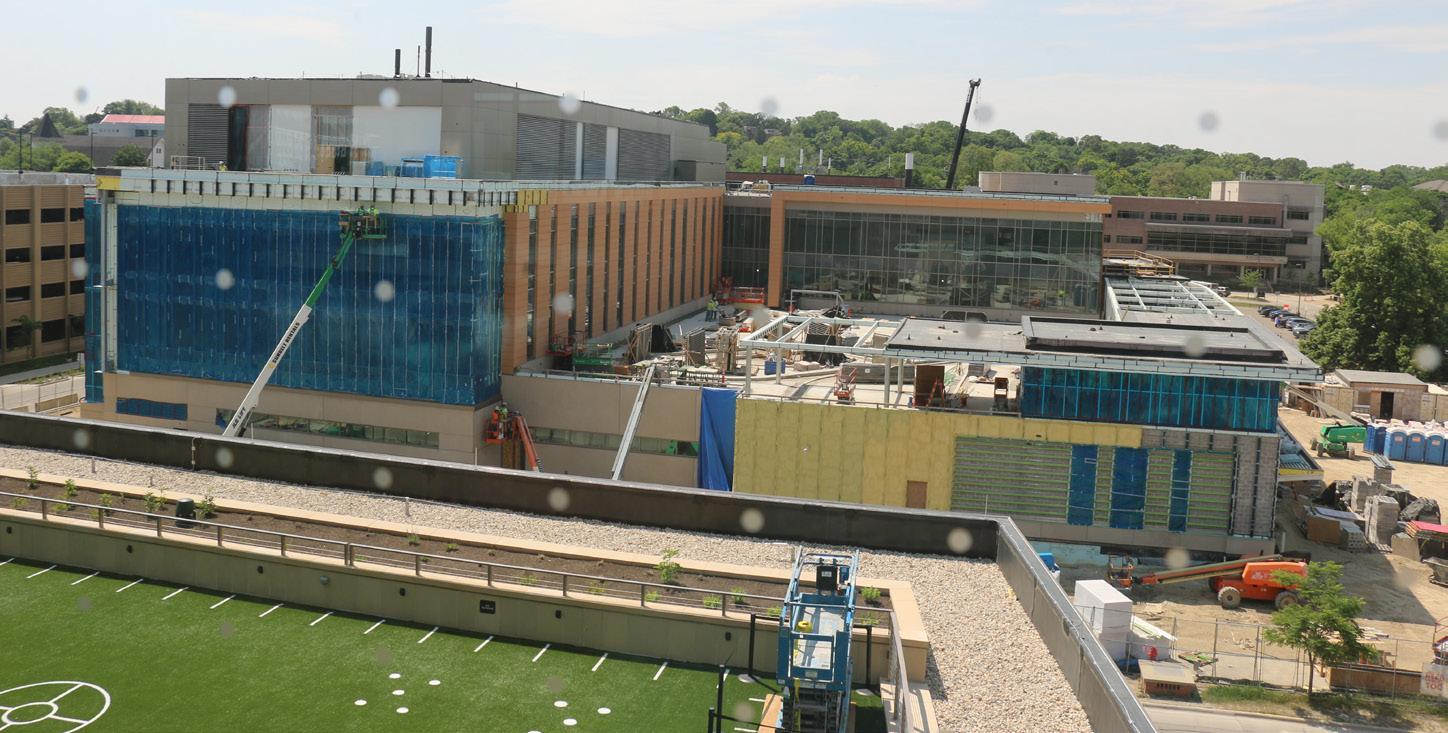
thank the generous donors who provided funding for the production of this publication.
